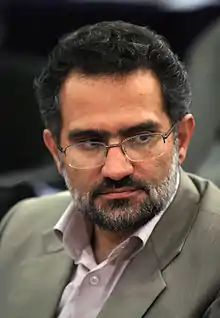Mohammad Hosseini (politician)
Mohammad Hosseini (born 1961) is an Iranian politician who served as minister of culture in the second cabinet of Mahmoud Ahmadinejad. He is also a military figure and the veteran of the Iran–Iraq War. He is part of the Mahmoud Ahmedinejad's close circle.[1]
Mohammad Hosseini | |
|---|---|
 | |
| Minister of Culture and Islamic Guidance | |
| In office 3 September 2009 – 15 August 2013 | |
| President | Mahmoud Ahmedinejad |
| Preceded by | Hossein Saffar Harandi |
| Succeeded by | Ali Jannati |
| Member of the Iranian Parliament | |
| In office 25 February 1997 – 28 May 2000 | |
| Constituency | Rafsanjan |
| Personal details | |
| Born | 1961 (age 59–60) Rafsanjan, Iran |
| Nationality | Iranian |
| Political party | YEKTA Front |
| Alma mater | University of Tehran |
| Military service | |
| Branch/service | Revolutionary Guards |
| Battles/wars | Iran–Iraq War |
Early life and education
Hosseini was born in Rafsanjan in the Kerman province in 1961.[2] He holds a PhD in Islamic jurisprudence and the fundamentals of Islamic law from Tehran University in 1994.[2]
Career
Hosseini joined the Islamic Revolutionary Guard Corps (IRGC) after the 1979 revolution and served during the Iran–Iraq War.[2] After the war, he served in different posts, including the head of the Sorush Publications, deputy director of the Islamic Republic of Iran Broadcasting, and advisor of the Islamic Culture and Relations Organization.[3] He also served as Iran's cultural consular in Kenya.[2] In addition, he taught fiqh and Islamic law at Tehran University.[3] He was also a member of the fifth Majlis, representing his hometown, Rafsanjan, in the 1990s.[2] During his tenure at the Majlis he also worked as the vice minister of science.[4]
Hosseini was appointed minister of culture on 3 September 2009, replacing Hossein Saffar Harandi in the post.[5][6] Hosseini won 194 votes in favor and 61 votes against at the Majlis.[7] In the cabinet of Mahmoud Ahmedinejad, Hosseini was one of the ministers who had experience in the IRGC.[8]
Hosseini's term ended on 15 August 2013 and he was replaced by Ali Jannati in the post.[9]
Sanctions
The European Union sanctioned Hosseini in October 2011 due to his alleged repressive approach against journalists in Iran.[5] It was also argued by AFP that he had been reinforcing media censorship and the arrest of journalists in Iran.[5]
References
| Wikimedia Commons has media related to Mohammad Hoseini (Iranian Minister). |
- Alfoneh, Ali (Spring 2011). "All Ahmadinejad's Men". The Middle East Quarterly. XVIII (2): 79–84. Retrieved 27 July 2013.
- "A Brief Biography of Iran's New Ministers". Payvand. 7 September 2009. Retrieved 22 February 2013.
- "Mohammad Hosseini to helm Iranian Culture Ministry". Payvand. Tehran. Mehr News Agency. 5 September 2009. Retrieved 31 January 2013.
- Louisa Glenn (1 September 2009). "Background brief: Ahmadinejad's cabinet". National Democratic Institute. Archived from the original on 8 July 2013. Retrieved 1 July 2013.
- "Dr. Mohammad Hosseini". Foundation of Defense of Democracies. Retrieved 31 January 2013.
- Kazemzadeh, Masoud (2007). "Ahmadinejad's Foreign Policy". Comparative Studies of South Asia, Africa and the Middle East. 27 (2): 423–449. doi:10.1215/1089201x-2007-015. Retrieved 12 February 2013.
- Shoaei, Hanif (2 September 2009). "Iran's Parliament approves a hard-line Cabinet in Tehran". Demotix. Archived from the original on 29 October 2013. Retrieved 28 June 2013.
- "Assessing Ahmedinejad's close circle" (PDF). Jane's Islamic Affairs Analyst. 26 January 2010. Retrieved 31 January 2013.
- "Iranian Parliament Gives Vote of Confidence to Majority of Rouhani's Proposed Ministers". Fars News. 15 August 2013. Archived from the original on 1 October 2015. Retrieved 15 August 2013.

